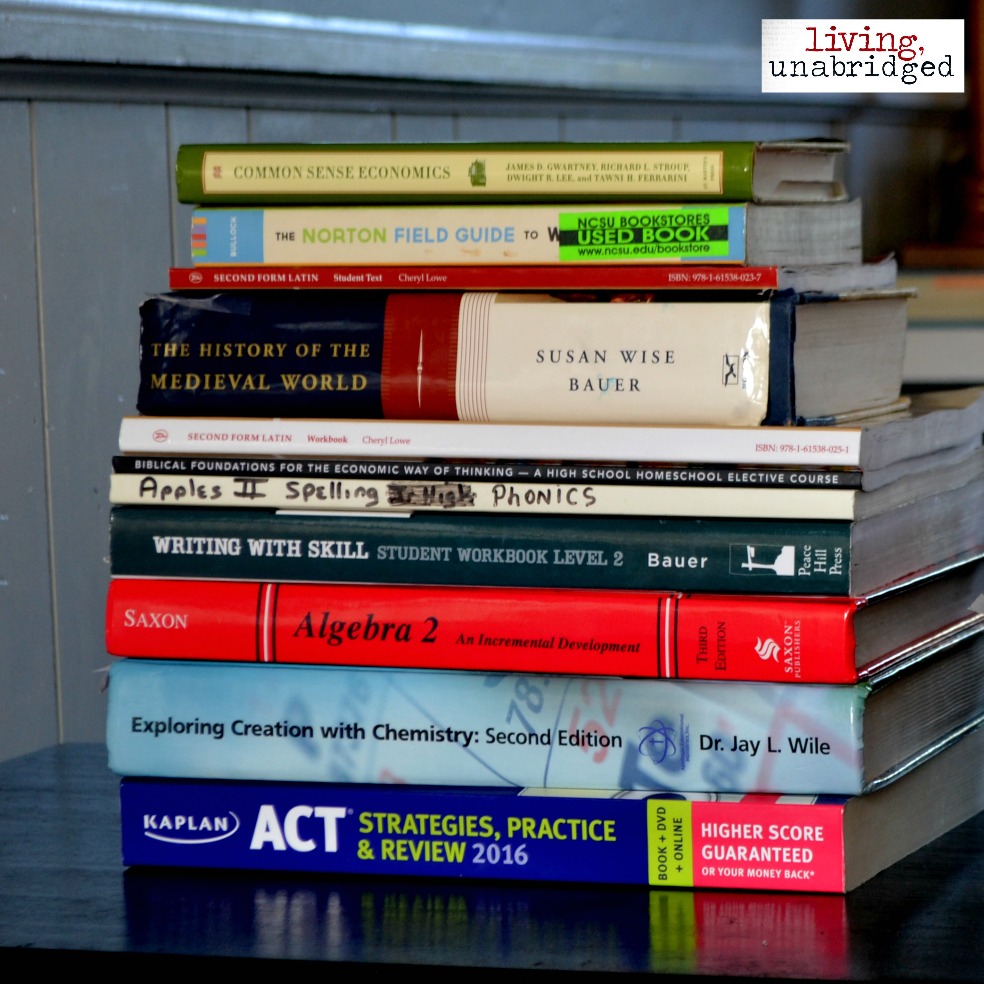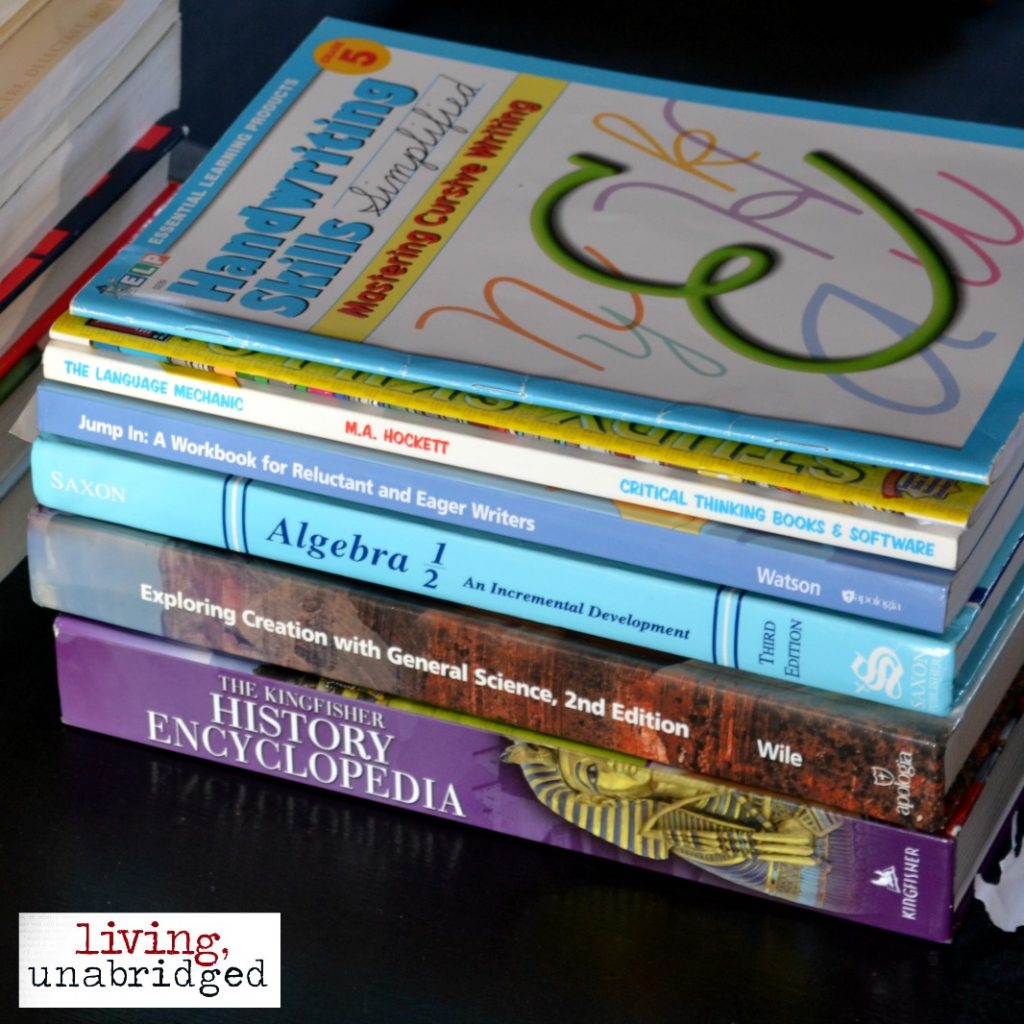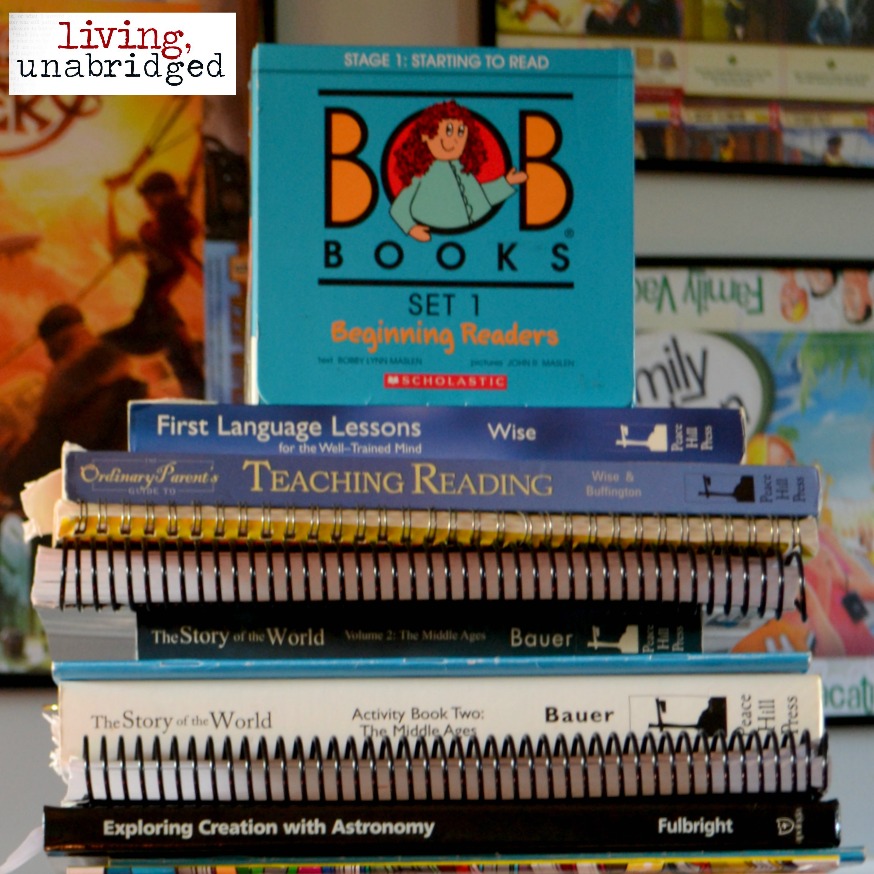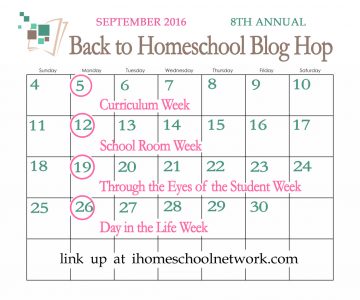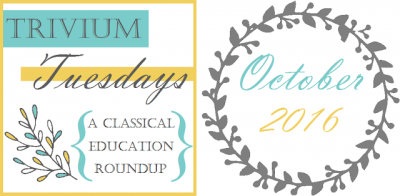Curriculum doesn't actually mean textbooks, did you know that? Curriculum means "subjects comprising a course of study". Anyway, that's the definition. But teachers and homeschool parents often use the word curriculum to mean "what textbooks and resources we're using".
So, this is a quick overview of the texts, resources, and plans our family is using this year.
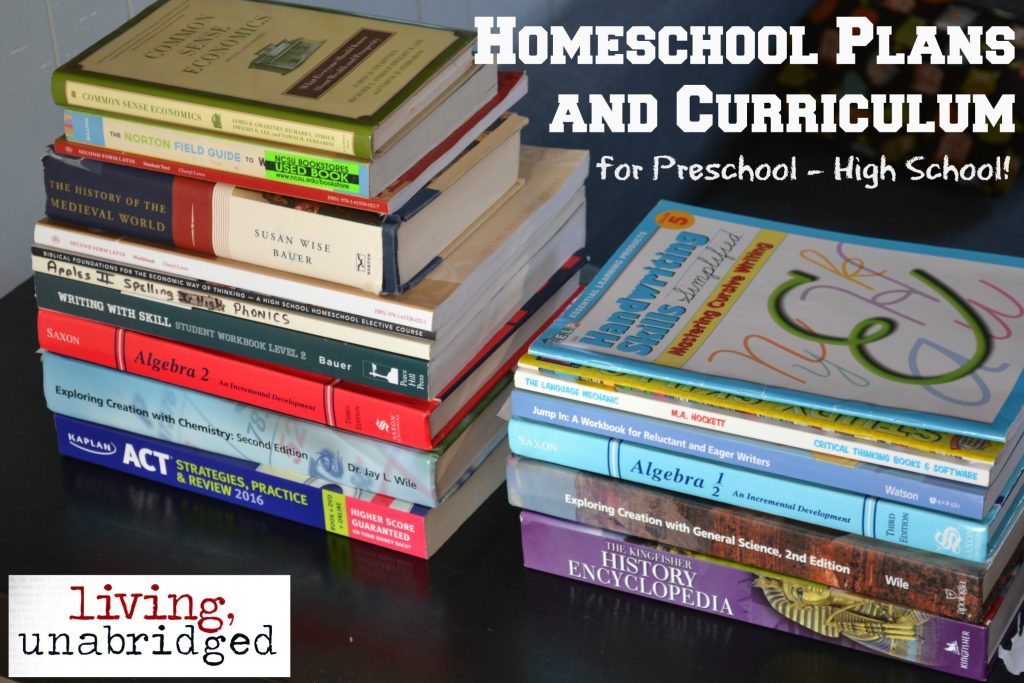 Homeschool Plan for All Ages
Homeschool Plan for All Ages
We have six children and they range in age from 1 to nearly 15. Which means I have:
- A baby / toddler just learning to walk, still taking at least one nap a day (often two), and into everything when he isn't sleeping
- A preschool boy age 3 who is precocious (extensive vocabulary / already knows most of his letters and some of their sounds), often loud, and not content to play alone for long
- A nearly-six year old who is working at roughly 1st grade level, still learning to read, and just starting to learn the discipline of work
- A nine almost-ten year old who is working at roughly 4th grade level, still struggles with reading, and is easily distracted
- An almost-twelve year old working at mostly 7th grade level (middle school), just learning self-discipline in school work, and is also easily distracted
- An almost-fifteen year old doing her Sophomore (10th grade) year of high school, very self-directed but dealing with a heavier workload and other things competing for her attention
How I Get All our Homeschool Plans Done
I don't. Next question?
OK, seriously, here are my top tips for homeschooling so many different children in so many different stages:
- Non-negotiables first. We read aloud together from several different books, we work on our church children's program memory work, and we memorize poems. These things + math = minimum "school day"
- Put the youngest students first. Phonics lesson and math with my young elementary student (and preschooler, often) need to happen before I get busy with the older kids, the house, my blog, etc. If I don't work with them first, it doesn't happen.
- Combine when possible. I already mentioned our read alouds, which happen with everyone. History and Science are two of the subjects that I most often combine. Latin and Greek are more subjects we try to cover in groups.
Our Favorite Homeschool Resources
(I'm going to share some of our textbooks and such with you. I will be linking to these resources on Amazon when I can, but I always encourage you to find the most cost effective resources you can. There are some fantastic used curriculum sale groups on Facebook now.)
These are some of the 10th grader's stack. Her main subjects this year:
- Algebra 2 (she's more than 1/2 finished with this) from Saxon Math. When she finishes she'll move on to Advanced Math.
- Chemistry from Apologia. We also have the companion CD-ROM, notebooking pages from Currclick, and a co-op lab.
- History of the Medieval World (plus mapwork and an extensive reading list)
- Writing with Skill from Peace Hill Press (now Well Trained Mind Press)
- Second Form Latin (she more than 1/2 finished with this as well) When she finishes this book we'll order 3rd Form Latin from Memoria Press.
- Economics (See my review of Biblical Foundations for the Economic Way of Thinking)
- ACT practice. She does want to attend college, so this is to assist her in preparation for that. She has never taken a standardized test before. Our educational philosophy is "No Testing Until Necessary" and now it's finally necessary. {wink}
- Spelling. She does Apples a Day 2 by choice because she is not a strong natural speller
- French from Rosetta Stone (plus other French resources we have)
In our co-op she's taking a Chemistry Lab (also using Apologia Chemistry), a college prep Medieval History and Writing course (hence the Norton Field Guide to Writing in her stack), a gym class, and a drama class where she has a major role in our co-op play.
Some plans for our middle school student:
- Algebra 1/2 from Saxon
- Jump In Writing from Apologia
- The Language Mechanic from Critical Thinking Books
- Exploring Creation with General Science from Apologia
- The Story of the World 2: Middle Ages + notebooking from The Kingfisher History Encyclopedia + an extensive reading list
- Latin from Classical Academic Press. Memoria Press Latin is not working for this child so we're going to switch to CAP. I haven't decided whether to do Latin for Children with this student and her younger sisters or to put her straight into Latin Alive. Still mulling it over (and hoping to find a deal on one or the other used from another homeschool family.)
In our co-op she's taking an American History class, a gym class, a Narnia class, and Drama because she also has a role in our co-op play.
Our elementary age students are using:
- CTC Math. I may move the nine year old back into Saxon 54 at some point this school year, but right now CTC is building her confidence and helping Math not be something to dread. The almost-six year old loves CTC Math because she loves getting to use the computer. I also do a lot of hands on Math with both of them (using Cuisenaire rods, pattern blocks, dice, etc.)
- Exploring Creation with Astronomy from Apologia. They each have a notebooking journal as well. This won't take the entire school year so we'll do a unit on Earth Science after we finish this.
- The Story of the World 2: The Middle Ages. They listen to the Jim Weiss audio CD, color the coloring page from the activity book, and I do the mapwork with them. We choose read alouds that go along with this study.
- First Language Lessons. I actually only use this to guide me in teaching them grammar. (We have been doing our grammar study together as part of our "morning time".)
- Phonics from The Ordinary Parent's Guide to Teaching Reading. I've used this with all my children. It's the best homeschool $20 I ever spent. The six year old is learning to read and the 9 year old is reviewing. Bob Books are our favorite way to put our phonics skills into practice.
- Song School Latin 2 from Classical Academic Press. These two have just finished book 1 and I need to order book 2. (Again, I am trying to buy this resource used, so if you're selling a copy, let me know!)
- Handwriting from Essential Learning Products. The six year old is working on manuscript, the nine year year old is learning cursive.
In our co-op the 9 year old is taking Ohio History, Skywatching, Ballet, and Guitar. The 6 year old is taking Gym, Literature with Living Books, Ballet, and Fine Motor Skills.
Plans for Our Preschool Students:
- Lots of reading aloud
- Stacks of puzzles, building toys, and games
- Plenty of listening in to their older siblings' lessons
- Loads of making messes.
- Tons of interrupting. Yes, it is just a reality of homeschool life: the little guys are making messes while I'm busy with the older kids. And if they're not busy making messes, they're interrupting us. We'll survive.
Homeschool Plans for Things We Do Together
We are also using the following things, generally in our "Morning Time" part of our school day:
- The Fallacy Detective. We read one chapter of this aloud every week.
- Linguistic Development Through Poetry Memorization from IEW. I used to choose poems for each child to memorize but I found we were skipping them far too often (and it was complicated having everyone memorizing different poems). I had a copy of this little text from a used curriculum sale a few years ago and I decided to try it with my elementary age kiddos (and anyone else listening in). We don't make a big deal of this. We just recite the poems they've already memorized and read through our newest one and that's it.
- Mad Libs. I am confident teaching Grammar without an extensive text (although I sometimes refer to First Language Lessons) and we do these for fun some mornings.
- Music Appreciation from Zeezok. My children actually request this.
- Fun Math reading, like Sir Cumference Books (see related resources from Math Geek Mama) or Life of Fred
Everything I've listed here does not get done every day. We do not do everything the way we did when there were only one or two students. I use more computer programs, DVDs, CDs, etc. than I used to. My husband assists with our oldest's schooling a lot more than he did when she was younger. (I had a hard enough time with Algebra 2 the first time!)
Please, homeschool mamas, do not overwhelm yourselves as you plan your year.
You do not need to cover All. The. Things. every day of every school year. Your child's education will have gaps, but they will be FINE. I promise.
Use these curriculum ideas as suggestions, or jumping off points. Do what works for your family. Sell what isn't working to another homeschool family. All families are different. Circumstances change. Everyone has different resources, strengths, and weaknesses.
It's going to be a great year!
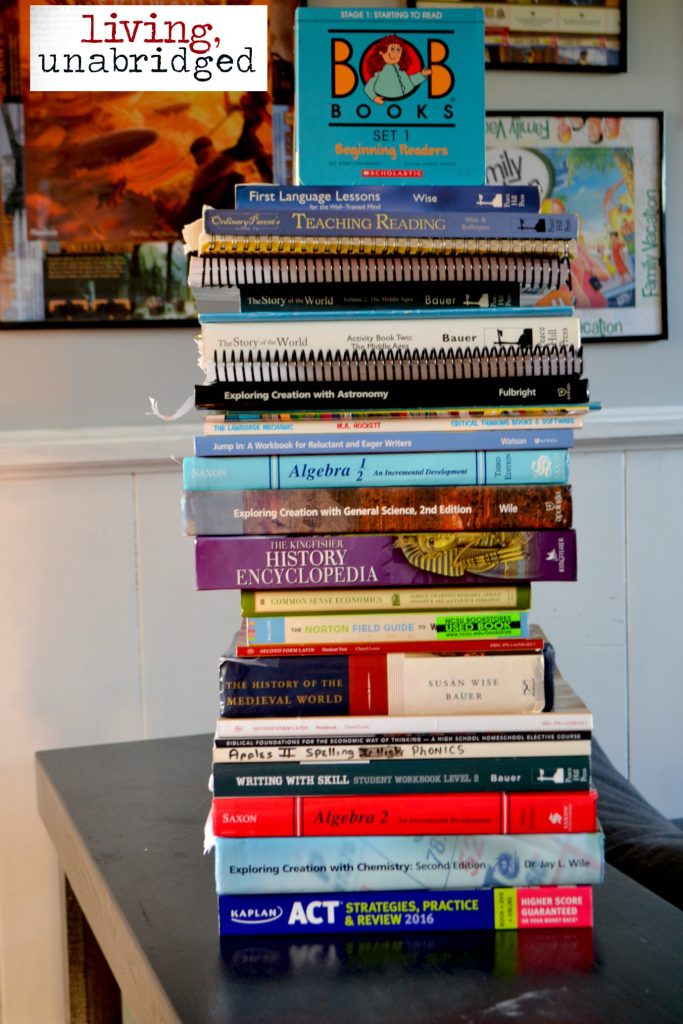
To see what other families are using this year check out the Back to Homeschool Blog Hop from iHN:

